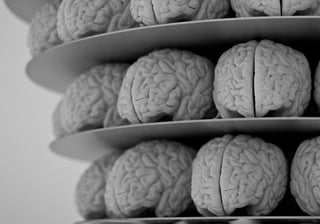- Privacy Policy
- Terms & Conditions
- Contact us
- ©Isabel Healthcare 2020
Symptom: Memory Loss - What is normal?
 Memory loss (amnesia) is an inevitable part of the aging process. As we grow older it becomes more noticeable that we forget people’s names or where we have put our bags, as well as appointments and events. Most of these memory lapses are just a normal part of the aging process, but sometimes they can be an indication of a developing memory problem. It is important to recognize the symptoms for memory related illnesses, and understand how they can treated. Many instances of cognitive memory loss which have an organic cause can be treated, if detected and recognized early, helping the patient lead a fuller life.
Memory loss (amnesia) is an inevitable part of the aging process. As we grow older it becomes more noticeable that we forget people’s names or where we have put our bags, as well as appointments and events. Most of these memory lapses are just a normal part of the aging process, but sometimes they can be an indication of a developing memory problem. It is important to recognize the symptoms for memory related illnesses, and understand how they can treated. Many instances of cognitive memory loss which have an organic cause can be treated, if detected and recognized early, helping the patient lead a fuller life.
How the brain ages
The brain has over 100 billion nerve cells called neurons, and these cells carry all the information and memories to and from the brain and the rest of the body in split seconds. When neurons have to communicate or pass on information, they do so using the connections in the brain called synapses. Over time, the synapses within the brain begin to weaken which affects how easily and quickly it is to retrieve memories. Another cause of memory loss occurs when the white matter which links different parts of the brain begins to die off, as the blood supply to the brain has diminished, again usually due to old age. Forgetfulness also occurs when the memory is not exercised enough to retrieve information to reconsolidate memories, which is why brain training exercises form a large part of treatment.
Symptoms of memory loss
Some common triggers for identifying a memory loss problem include:
- Difficulty performing familiar everyday tasks
- Becoming confused with dates and times
- Loss of memory and recall affecting day to day activities
- Language problems and expressing yourself
- Abstract thinking disruption
- Poor decision making or judgement
- Misplacing items
- Frustration
Causes of memory loss
Normal age related forgetfulness
This is common as you age and includes things like forgetting your glasses, difficulty recalling names or walking into a room and forgetting why you entered. You are normally able to recall and describe episodes of forgetfulness after they occur.
Anxiety
Memory loss can also result due to stress. If you are stressed or very anxious your body releases more of a hormone known as cortisol. It has been shown that excess cortisol can increase memory loss. Anxiety is an intense distraction and as you are distracted you have problems with your memory as your focus is elsewhere. Sleep deprivation also contributes to anxiety and therefore influences your memory.
Disease conditions
Memory loss should always be investigated, as sometimes it may be caused by underlying conditions or trauma. Some examples of these are: stroke; head injury; underactive thyroid (hypothyroidism); certain medications you may be taking; vitamin B1 (thiamine) deficiency; and subarachnoid haemorrhage.
Mild cognitive impairment (MCI) and dementia
This is an intermediate stage between normal age related conditions and more serious dementia. Mild cognitive impairment normally progresses to more serious forms of dementia such as Alzheimer’s disease, but if recognized and treated early with medications then the deterioration can be slower and managed more effectively. Symptoms of MCI and dementia include difficulty performing normal day to day activities including paying bills, dressing or doing household chores, unable to recall instances of memory loss, getting lost or disorientated, forgetting words, sentences or repeating phrases, and trouble making choices or decisions.
Different Types of Memory Loss
Identifying the types of memory loss you are experiencing is very important. Types of memory loss include:
- Immediate memories – unable to recall sounds or remember something which happened only in the previous few seconds
- Short-term or recent memories – unable to recall telephone numbers or information which normally stays in your memory for 20 seconds or so. The brain can normally store several chunks of short term information at a time
- Long-term or remote memories – memories which have occurred during your life time but are permanent memories, meaning you have repeatedly recalled them over time when thinking.
Preventing memory loss
 If you are experiencing some memory loss or you want to prevent symptoms occurring, there are certain things you can do to help keep your neurons and synapses firing, and help pick up on any more serious memory problems quickly.
If you are experiencing some memory loss or you want to prevent symptoms occurring, there are certain things you can do to help keep your neurons and synapses firing, and help pick up on any more serious memory problems quickly.
Keep your memory active
Research has shown keeping your memory active can have a significant impact on ensuring you do not suffer the effects of memory loss. Here are our top 5 tips on keeping your memory active:
- Play memory games and keep your memory active – do Sudoku, play cards, or try a brain training app.
- Write a daily blog or diary of your activities so you are recalling your memories
- Play memory games with children, as this will keep you both occupied, stimulating your memory while helping children learn and develop their brain.
- Ensure you take adequate exercise which is good for promoting overall physical and mental health, keeping your whole body active
- Ensure you get enough sleep, as well as keeping stress and anxiety to a minimum. A healthy, well rested lifestyle will help your brain to function at its best.
Talk to your doctor about your symptoms
If your memory problems persist or you have concerns, then consult with a health professional. You can prepare for your consultation by placing all your symptoms through Isabel, which will give you a list of possibilities to discuss with your doctor. It can also be useful to going in with answers to the following questions:
- How long have you had problems with recalling events?
- A good idea is to keep a memory diary documenting what memory recall problems you have had and try and classify them into immediate memories, short term memories or long term memories. If necessary, ask a family member or friend to help you keep a diary as sometimes two brains are better than one, and then take your diary with you to your appointment
- What symptoms are you experiencing?
- Are you suffering from stress or have you had any life event which is causing you concern?
- Are you having problems sleeping?
- Do you have any other medical conditions?
- Are you taking any medications?
It is also useful to write down and take any questions you would like to ask your doctor. You and your doctor both want to come away from your appointment with as much information as possible, so you can both work towards a diagnosis and treatment plan. Thinking about the questions which you want answered will help ensure you get the best out of your consultation and to help reassure you about your memory loss symptoms. Questions to consider are:
- Is my memory change normal for a person of my age?
- Do you think my memory loss is just part of the normal ageing process or could I have early dementia?
- What treatments or programs are available to me to help alleviate my memory loss symptoms?
- Will my memory loss symptoms increase over time?
- Have you any support groups I can contact to receive further information or help?
Take a look at the Isabel Symptom Checker now and try entering your symptoms:

Mandy Tomlinson
Mandy has worked for Isabel Healthcare since 2000. Prior to this, she was a Senior Staff Nurse on the Pediatric Infectious disease ward and high dependency unit at one of London's top hospitals, St Mary’s in Paddington which is part of Imperial College Healthcare NHS Trust. Her experience in the healthcare industry for the past 28 years in both the UK and USA means she's a vital resource for our organization. Mandy currently lives and works in Scottsdale, Arizona.
Subscribe Here!
Recent Posts
Virtual Triage: Do more questions lead to better patient outcomes?
One of the common misconceptions related to virtual triage / symptom checker tools is that the more..Webinar: Using Virtual Triage To Transform Patient Access
Outdated contact centers are posing problems for today's health systems. As longer hold times..List Of Categories
- Differential Diagnosis Decision Support
- Differential diagnosis
- Symptom Checker
- Symptoms
- Medical Error
- Patient Disease Information
- Disease
- Diagnostic Decision Support
- Clinical Decision Support
- Isabel 1 Minute Read
- Diagnosis Error
- Diagnosis Skills Cases
- Healthcare Informatics
- Medical Education
- Patient Engagement
- Clinical Reasoning
- Evidence-based Medicine
- Symptom Triage
- Nurse Practitioner Education
- Nursing Decision Support
- Partnership
- Public Health
- COVID-19
- EHR
- Patient Empowerment
- Patient Safety
- rare disease

Start your FREE Trial today
Try the Isabel Pro DDx generator for 30-days - no payment card details required.




